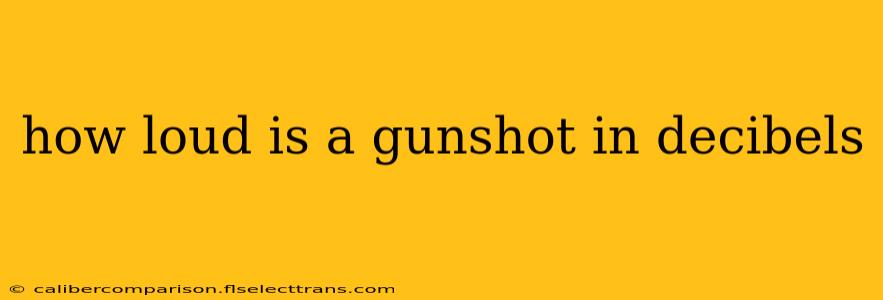The loudness of a gunshot is a complex issue, not easily summarized with a single decibel (dB) figure. The sound level varies dramatically depending on several factors. This article will delve into these variables, providing a clearer understanding of the noise associated with firearms and the potential impact on hearing.
Factors Affecting Gunshot Loudness
Several key elements contribute to the decibel level produced by a gunshot:
-
Caliber: Larger calibers generally produce louder sounds. A .22 pistol will have a significantly lower dB reading than a .30-06 rifle. The larger the projectile, the greater the explosive force and consequently, the louder the report.
-
Type of Firearm: The design of the firearm itself influences noise levels. Certain firearm types, like shotguns, might exhibit higher dB readings than handguns of comparable caliber due to their design and the dispersal of gases.
-
Ammunition Type: The type of ammunition used – specifically the powder charge – significantly impacts loudness. High-powered ammunition will produce a much louder sound than lower-powered rounds.
-
Suppression: The use of a suppressor (silencer) dramatically reduces the sound of a gunshot, although it doesn't eliminate it entirely. Suppressed firearms produce a noticeably quieter report.
-
Environment: The environment plays a role. Shooting outdoors in an open space will result in a different sound level compared to shooting indoors, where sound waves reflect and amplify the noise.
Decibel Ranges: A General Overview
While pinpointing a precise dB level for a gunshot is impossible without specifying the factors above, we can offer a general range. Unsuppressed gunshots typically fall within the range of 140-160 dB, or even higher. This is significantly louder than a jet engine at takeoff (approximately 120 dB) and can cause immediate and permanent hearing damage.
Suppressed firearms can reduce the sound level to approximately 110-130 dB. While still loud and potentially harmful, the reduction is substantial.
Hearing Protection: Essential for Safety
Given the extremely high decibel levels involved, hearing protection is absolutely crucial when handling firearms. Hearing damage from gunshots is cumulative; repeated exposure, even to seemingly "low" levels, can cause long-term hearing loss. It’s not just about protecting against immediate damage from the gunshot itself; the noise from multiple rounds fired in succession presents a very real danger. Always use hearing protection rated for high-decibel environments, such as electronic muffs or high-noise-reduction-rating (NRR) earplugs.
Conclusion
The loudness of a gunshot is not a static value. It's a complex interplay of various factors. Understanding these factors helps us appreciate the significant risk to hearing and underscores the importance of consistently using appropriate hearing protection while handling firearms. Remember, your hearing is invaluable—protect it.

